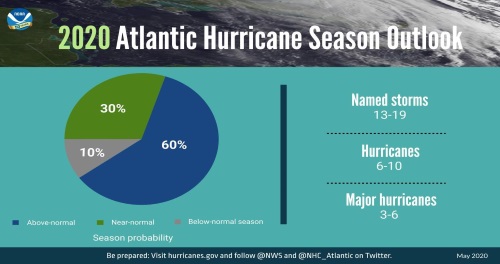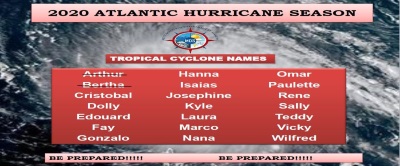The NOAA’s Climate Prediction Center has released its forecast for the 2020 Atlantic hurricane season. Similar to various other predicting institutions the forecasters at the National Weather Service are forecasting a very busy season. NOAA states that there is a 60% chance of an above-normal season, a 30% chance of a near-normal season, and only a 10% chance of a below-normal season. In a normal season, there are about 12 named storms 6 of which become hurricanes and 3 are major hurricanes.
NOAA’s Climate Prediction Center is forecasting a likely range of 13 to 19 named storms, of which 6 to 10 could become hurricanes, including 3 to 6 major hurricanes.

The combination of several climate factors is driving the strong likelihood of above-normal activity in the Atlant ic this year.
1. El Nino Southern Oscillation (ENSO) conditions are expected to either remain neutral or to trend toward La Nina, meaning there will not be an El Nino present to suppress hurricane activity.
2. warmer-than-average sea surface temperatures in the tropical At the Atlantic Ocean and Car Caribbean Sea, coupled with reduced vertical wind shear.
3. Weaker tropical At lant ic trade winds.
4. An enhanced West African monsoon.
These are similar conditions, which have been producing more active seasons since the current high-activity era began in 1995.
As we focus on protecting families and ourselves during this present global health crisis and as governments and leaders place emphasis on public health and put plans in place to safely reopen our borders, it is very important that we remember to make the necessary preparations for the upcoming hurricane season.
Alt hough, all forecasts so far indicate a very active 2020 season these forecasts, however, should not determine our level of preparation. Whether the forecast goes for an above-average or below-average season, our level of preparation should be the same. What matters is whether our country gets impacted and this can happen in any season; active or not. It is also very important to remember that active tropical waves or heavy rainfall events can also have devastating impacts on our lives it does not have to be a storm or hurricane. Therefore, preparedness is key.
The Meteorological Department St. Maarten (MDS) will mo nit or the development of all tropical systems closely and will issue watches or warnings when it becomes necessary using various communication mediums; radio, newspaper, through our website (www.meteosxm.com,), Facebook (facebook.com/sxmweather/). It is critical that the public seek credible information from the official authority in order to make timely decisions that will protect life and property.












